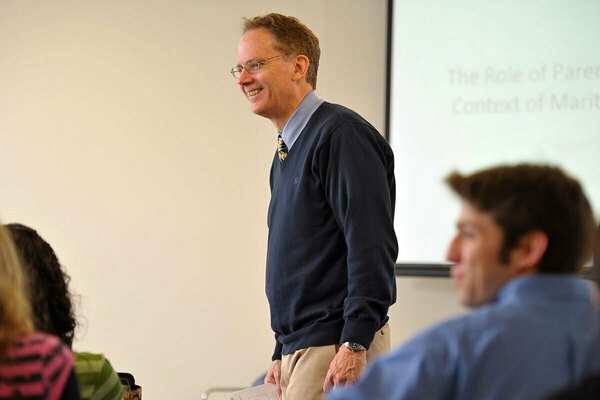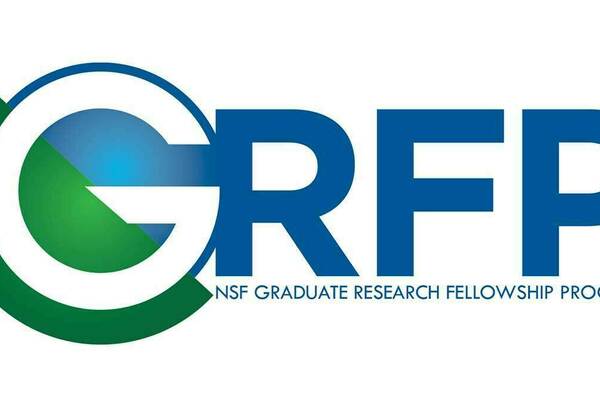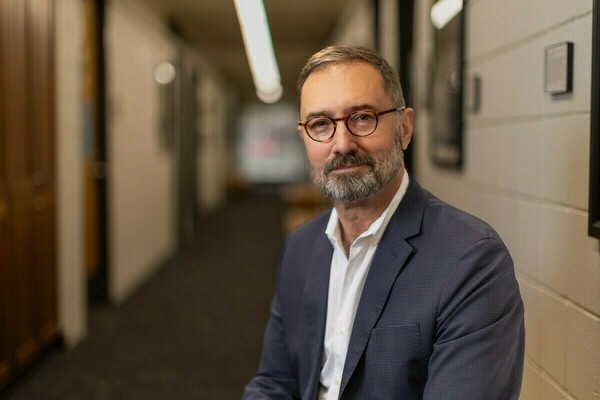
The numbers alone are remarkable.
Notre Dame psychologist E. Mark Cummings has secured $40 million in grant funding to conduct ground-breaking research. He’s produced 366 publications — including 13 books, 279 journal articles, and 58 chapters in scholarly volumes. Other scholars have cited his findings more than 50,000 times. And his curriculum vitae is 67 pages — without including any of his presentations over the past 20 years.
“That would make it too long,” he said with a laugh.
In honor of his long track record of accomplishments as a scholar, the William J. Shaw Center for Children and Families Professor of Psychology has been named the inaugural winner of the College of Arts & Letters Research Achievement Award.
The honor recognizes a tenured faculty member who demonstrates significant scholarly achievement and impact, as well as leadership, extraordinary innovation, and engagement with the University’s research and educational mission. Cummings will receive the award at the A&L spring faculty meeting at 3:30 p.m. Tuesday, May 2, in McKenna Hall, at which Jean Porter, the John A. O’Brien Professor of Theology, will receive the inaugural College of Arts & Letters Graduate Student Mentorship Award.
After the event, Cummings will probably go back to work — as director of the Family Studies Lab, he’s simultaneously involved with multiple externally funded research projects, including many supported by the National Institutes of Health (NIH). His mantra is a slight variation of Nike’s famous “Just do it” slogan.
“I have work to do,” he said, “and I do it.”
‘I kept pushing ahead’
For Cummings, though, success as a researcher wasn’t immediate.
His grant-writing skills took awhile to develop — during his first two years at Notre Dame, and 10 years before that, none of his research proposals to the NIH were funded.
“I was getting turned down every single time,” he said.
The rejections, though, didn’t faze him. In fact, he learned how to develop strong research proposals by serving for many years as an NIH grant reviewer.
“A long time ago, I stopped worrying about a lack of success. I kept pushing ahead,” he said. “If I feel passionate about something, I have a sense that it will work out eventually, and I keep pursuing it.”
The field of psychology is fortunate that he did; much of his work has centered on the emotional security theory that he developed with Patrick Davies, then his graduate student at West Virginia University and now a professor at the University of Rochester. The theory stipulates that family relationships beyond that of the mother and child — inter-parental, father-child, and sibling relationships — also are important to children’s adjustment and well-being.
“First, we need to understand relationships empirically, research-wise, then translate the findings about what is important into treatment programs. We need to take evidence and translate it into intervention.”
For decades, he’s been focused on examining how families function and devising ways to best support children and families.
“First, we need to understand relationships empirically, research-wise, then translate the findings about what is important — for example, the emotional security of children and families — into treatment programs,” he said. “We need to take evidence and translate it into intervention.”
In her nomination letter, Department of Psychology chair Cindy Bergeman wrote that she couldn’t imagine a better recipient than Cummings for the award.
In addition to being internationally recognized for his valuable contributions to psychology, Bergeman wrote, Cummings is a prolific and influential scholar who “has extraordinary grant-writing skills, is supportive of junior scholars at all levels (undergrad, graduate, postdoctoral, and junior faculty), and is a role model for others in the department starting their research careers.”
‘Every context is different’
When he became a fellow with the Kroc Institute for International Peace Studies, Cummings began thinking about how community conflict affects children and family functioning — and his international research and projects now include work with children and families in Italy, China, Spain, Chile, Wales, Norway, Germany, Switzerland, Honduras, Iran, Israel, and Palestine.
In one of his current projects, he’s collaborating with associate professor Laura Miller-Graff. They developed a sustainable, evidence- and culturally based intervention program to strengthen the mental health of parents and children, and fortify emotional security and healthy communication for Palestinian families experiencing ongoing conflict in East Jerusalem, the West Bank, and Gaza.

In the pilot program, Palestinian youth demonstrated significant improvement in adjustment problems, resilience and security within the family. And, parents were better able to regulate their emotions, which was associated with lower levels of depression.
Cummings said the need for such interventions for children and families — in the United States and worldwide — is staggering.
“The United Nations estimates there are 1 billion children exposed to political violence in the world at any one time, and there’s almost no work toward understanding that, beyond documenting the negative impact on children,” he said. “Little is known about how or why children are affected, and therefore there’s limited basis for developing effective interventions to help children and families amidst political violence and war.”
So Cummings seeks to continue expanding the scope of what, how, and where he can contribute. He’s looking to explore projects in Ukraine, Nigeria, as well as with gangs in the U.S. and Honduras. “Every context is different,” he said, “and we need to adapt intervention programs to the context.”
He became fascinated with psychology in an undergraduate class with Mary Ainsworth at Johns Hopkins University, an innovative researcher of attachment theory. The theory, which posits that a strong emotional bond between mother and child is essential to development, was a major departure from what other psychologists thought at the time: that attachment was based on rewards-reinforcement.
“This really resonated with me,” he said. “I grew up a Navy brat. My dad was in the Navy, and we moved a lot. My mother died when I was 5, so we had a lot of transitions and relationship challenges, so this was interesting to me.”
“Notre Dame is a positive, supportive environment and is dedicated to excellence. I appreciate that. The emphasis is on quality of work, being innovative, and making a difference. I think that’s been a big factor in my success here.”
‘Dedicated to excellence’
Cummings’ research centered on relationships and conflict, and his desire to help others through his work, have been acknowledged before. In 2017, Cummings won the American Psychology Association's Urie Bronfenbrenner Award for Lifetime Contribution to Developmental Psychology, for bettering the condition of children and families.
Bergeman said Cummings continues to be a dynamic contributor at all levels, and does not rest on his considerable laurels.
“Beyond all his accomplishments, he is a wonderful departmental citizen,” she wrote, “always willing to roll up his sleeves and contribute to the betterment of the University.”
For Cummings, the University has been an ideal place to pursue his research.
“Notre Dame is a positive, supportive environment and is dedicated to excellence. I appreciate that,” he said. “The emphasis is on quality of work, being innovative, and making a difference. I think that’s been a big factor in my success here.”


